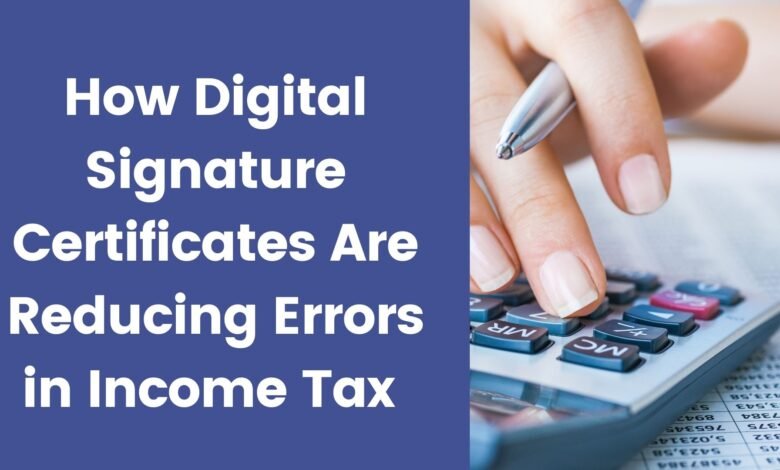How Digital Signature Certificates Are Reducing Errors in Income Tax

A Digital Signature Certificate is an electronic form of a signature that is used to authenticate the identity of the person signing a document. In the context of income tax filing, a DSC validates the authenticity of the returns and ensures that they have not been tampered with during transmission. Issued by certifying authorities, DSCs comply with regulations set by the Information Technology Act, of 2000, and are recognized by the Income Tax Department of India.
DSCs use public key infrastructure (PKI), which involves two keys – a public key and a private key. The private key, which is unique to the user, is used to sign the document, and the public key is used by the recipient to verify the signature’s authenticity. This cryptographic system ensures that only the intended parties can access or alter the information, significantly reducing the chances of fraud or tampering.
Common Errors in Income Tax Filing
Before diving into how DSCs reduce errors, it’s important to understand the types of errors that commonly occur in income tax filing:
- Manual Data Entry Errors: Filing income tax manually often results in typographical errors, incorrect figures, or omissions, especially when dealing with complex forms.
- Mismatches in Information: Discrepancies between the details filed in the return and the data available with the tax authorities (such as mismatches in PAN, income details, or bank account information) can lead to rejections.
- Document Misplacement: Physical documentation is prone to misplacement or loss, making it difficult to verify the information provided in the returns.
- Signature Errors: One of the most common errors in manual tax filing is improper or missing signatures. Incorrect or illegible signatures can render the filing invalid, leading to delays or penalties.
- Incorrect Attachments: Attaching the wrong supporting documents, or failing to attach required documents, can lead to inaccurate returns and potential audits.
- Fraudulent Filings: Fraudulent income tax filings, especially under another person’s identity, can cause serious legal and financial repercussions.
How Digital Signature Certificates Help Reduce Errors in Income Tax Filing
- Accurate Authentication
Digital Signature Certificates ensure that the person filing the return is the one who is legally authorized to do so. By eliminating the need for physical signatures, DSCs prevent errors related to incorrect or missing signatures. The digital signature is automatically verified by the Income Tax Department, ensuring that the return is properly authenticated without any manual intervention.
In contrast to handwritten signatures that can be difficult to verify, a DSC is embedded directly into the return, providing a clear and unquestionable trail of authentication. This reduces the risk of rejections due to improper or illegible signatures.
- Elimination of Manual Errors
One of the biggest advantages of using DSCs is that they automate the signing process, eliminating the potential for manual errors. When taxpayers manually input information or physically sign documents, there is a higher likelihood of mistakes, especially when managing large amounts of data.
DSCs streamline the process by allowing users to digitally sign their returns with a few clicks, ensuring the document is correctly signed and all mandatory fields are filled out. This reduces human error, ensuring that returns are submitted without mistakes that might otherwise lead to rejection or resubmission.
- Automatic Validation of Information
When filing income tax returns using a DSC, the system automatically cross-verifies information against various databases such as PAN, Aadhaar, and bank account details. This automated verification process helps in catching discrepancies early, preventing the submission of erroneous data.
For example, if there is a mismatch between the PAN details in the return and the Income Tax Department’s records, the system will flag the error before the return is submitted, allowing the user to correct it immediately.
- Secure Transmission of Documents
DSCs provide an additional layer of security by encrypting the data in the return. This ensures that the return, along with all supporting documents, is securely transmitted to the Income Tax Department without the risk of interception, tampering, or unauthorized access.
In traditional filing, physical documents could get lost or tampered with during transmission. However, with DSCs, the cryptographic protection guarantees that the documents reach the tax authorities intact and unchanged, reducing the likelihood of data manipulation or loss.
- Simplifying the Attachment of Documents
When using a DSC for e-filing, attaching supporting documents becomes much easier and more accurate. Instead of manually attaching physical documents, users can upload digital versions, which are then digitally signed using their DSC. This ensures that the documents are correctly linked to the tax return and eliminates the risk of attaching the wrong documents.
- Prevention of Fraudulent Filings
By ensuring that only authorized individuals can sign and submit tax returns, DSCs drastically reduce the chances of fraudulent filings. Each DSC is tied to a specific individual or entity, and the Income Tax Department can easily verify the identity of the filer. This authentication process helps prevent instances where someone might file a return under another person’s name or PAN.
- Time and Cost Efficiency
Using DSCs streamlines the entire income tax filing process, leading to faster submission times and fewer errors. With reduced manual intervention, taxpayers can avoid the time-consuming process of correcting mistakes or re-submitting returns. This also minimizes the chances of late filings, which can lead to penalties.
Moreover, as errors in the return are minimized, the need for scrutiny or audits is also reduced, saving both taxpayers and the tax authorities significant time and resources.
- Audit Trail for Future Reference
A major benefit of using DSCs is the audit trail they create. Each time a digital signature is used, it leaves a timestamped record that can be easily traced back to the individual or entity responsible for signing the document. This traceability provides a reliable way to track the filing process, allowing both taxpayers and tax authorities to verify the accuracy and legitimacy of the return.
In the event of an inquiry or audit, the digital signature serves as proof of the filer’s identity and the date of submission, reducing the chances of disputes or penalties related to missing or improper documentation.
- Compliance with Legal Standards
Digital Signature Certificates comply with legal standards set forth by the Information Technology Act and are recognized by various government bodies, including the Income Tax Department. By using a DSC, taxpayers ensure that their filings are legally valid and comply with all regulatory requirements.
This legal recognition reduces the chances of returns being rejected due to non-compliance with authentication standards, providing taxpayers with peace of mind that their filing is legally sound.
The Future of DSCs in Income Tax Filing
As the world moves towards greater digital adoption, the use of Digital Signature Certificates in income tax filing is only expected to grow. With continuous advancements in technology, DSCs are becoming even more user-friendly, secure, and integrated with e-filing platforms.
Emerging technologies such as blockchain and artificial intelligence are likely to enhance the functionality of DSCs, providing even greater accuracy and security in tax filing. In the future, we can expect DSCs to not only eliminate errors but also provide real-time tax filing insights, automated verification processes, and predictive analytics to further streamline the process.
Suggested Read – Class 3 Digital Signature Certificate For eTender
Conclusion
Digital Signature Certificates are proving to be an invaluable tool for reducing errors and enhancing the efficiency of the process. By providing accurate authentication, secure document transmission, and automated verification, DSCs eliminate many of the manual errors and discrepancies that commonly occur in traditional tax filing methods. As the adoption of digital filing continues to increase, DSCs will remain a key component in ensuring the accuracy, security, and compliance of income tax returns.




